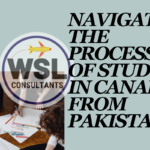Required Documents for a Visit to Canada from Pakistan
Embarking on visit to Canada requires meticulous planning, and at the heart of this process is the visa application. Understanding the documents required is crucial for a hassle-free application experience. Embarking on the visit to Canada to explore the scenic beauty and cultural richness of Canada is an exciting prospect for many Pakistani travelers. However, before setting foot on Canadian soil, a crucial step in the process is ensuring that you have all the necessary documents in order. From obtaining the right visa to preparing the essential paperwork, this guide will walk you through the required documents for a seamless and unforgettable visit to Canada from Pakistan. Whether you’re planning to experience its vibrant cities, majestic landscapes, or pursue educational and professional opportunities, having the correct documentation is the key to turning your Canadian dreams into reality.
Types of Canadian Visas
In the realm of Canadian visas, various avenues cater to the diverse needs of travelers, students, and professionals. The three primary types of Canadian visas are tourist visas, study visas, and work visas. Tourist visas are designed for those eager to explore the country’s natural wonders and cultural attractions. Study visas, on the other hand, open doors for international students pursuing education in renowned Canadian institutions, fostering academic growth and cultural exchange. Work visas are tailored for individuals seeking professional opportunities, enabling them to contribute to the Canadian workforce and immerse themselves in a new professional landscape.
Each visa category comes with its set of specific requirements, ensuring that applicants align with the intended purpose of their visit. Tourist visa applicants may need an invitation letter, hotel reservations, and proof of ties to their home country. Those pursuing study visas must furnish a letter of acceptance, educational transcripts, and evidence of financial capacity. Work visa applicants, on the other hand, need a job offer letter from a Canadian employer and an approved Labor Market Impact Assessment (LMIA). Understanding these distinctions is essential for prospective applicants, as it ensures they navigate the Canadian visa landscape with clarity and confidence.
General Requirements for Visa to visit to Canada
When it comes to applying for a visa to visit to Canada, there are general requirements that apply to all applicants, regardless of the specific purpose of their visit. These foundational prerequisites form the backbone of a successful visa application. Firstly, having a valid passport is paramount – it should be valid for the duration of the intended stay. Recent passport-sized photographs meeting the specified criteria are also mandatory.
Completing the visa application form accurately and thoroughly is another critical step. This comprehensive form captures essential details about the applicant, including personal information, travel history, and the purpose of the visit. Additionally, proof of financial capacity to support the visit to Canada is crucial. This often involves providing bank statements, employment letters, or other documentation demonstrating the ability to cover expenses during the visit.
Crafting a detailed travel itinerary outlining the planned activities and duration of stay is also necessary. This document helps immigration officials assess the purpose of the visit and ensures alignment with the intended visa category. Overall, these general requirements create a solid foundation for a visa application to visit to Canada, emphasizing the importance of meticulous preparation and adherence to guidelines.
Specific Requirements for Pakistani Applicants
For Pakistani applicants aspiring to obtain a visa to visit to Canada, there are specific requirements tailored to ensure a smooth and successful application process. Firstly, in addition to the general requirements, a tourist visa applicant from Pakistan may need to provide an invitation letter from a Canadian host, hotel reservation details, proof of travel insurance, and evidence of ties to their home country, such as employment letters or property ownership documents.
Individuals seeking a study visa must submit a letter of acceptance from a recognized Canadian educational institution, along with educational transcripts. Furthermore, proof of funds to cover tuition fees and living expenses during the study period is essential.
For those aiming for a work visa, a job offer letter from a Canadian employer is a key document. Additionally, an approved Labour Market Impact Assessment (LMIA) is required, indicating that the employment won’t negatively impact the Canadian job market.
Understanding and fulfilling these specific requirements tailored for Pakistani applicants are crucial steps in ensuring a successful visa application to visit to Canada. Thorough documentation and attention to detail play a vital role in demonstrating eligibility and purpose, enhancing the chances of approval.
Tips for a Successful Visa Application
Navigating the complexities of a visa application demands strategic planning and attention to detail. Here are essential tips for Pakistani applicants to enhance their chances of a successful visa application to visit to Canada:
- Plan Ahead: Begin the application process well in advance of your intended travel date. Delays can occur, and planning ahead allows for unforeseen circumstances.
- Seek Professional Advice: If the process seems overwhelming, consider consulting with an immigration consultant. Their expertise can provide valuable insights and guidance, especially for complex cases.
- Double-Check Documents: Before submission, meticulously review all required documents. Ensure they are complete, accurate, and meet the specific criteria outlined for your chosen visa category.
- Understand the Purpose: Clearly articulate the purpose of your visit in your application. Whether for tourism, study, or work, align your documentation and intentions with the selected visa category.
- Financial Preparedness: Demonstrate your financial capability to cover expenses during your stay. Provide clear and comprehensive proof, such as bank statements or sponsorship letters.
- Follow Online Guidelines: Utilize official online resources provided by the Canadian government. Follow the guidelines and instructions for the specific visa application process.
- Biometric Information: Be prepared to provide biometric information if required. Familiarize yourself with the process and ensure timely compliance.
- Honesty is Key: Provide truthful and accurate information in your application. Any false information can lead to complications and potential visa rejection.
- Stay Informed: Keep abreast of any updates or changes in visa policies and procedures. Staying informed ensures that your application aligns with the latest requirements.
- Communication: If there are uncertainties or additional information required, respond promptly to any communication from the Canadian visa authorities. Clear and timely communication can expedite the process.
By adhering to these tips, Pakistani applicants can approach the visa application process to visit to Canada with confidence and increase the likelihood of a successful outcome.
Common Pitfalls to Avoid
While pursuing a Canadian visa, it’s crucial to be aware of common pitfalls that applicants often encounter. Avoiding these pitfalls can significantly enhance the likelihood of a successful application. Here are key pitfalls to steer clear of:
- Incomplete Documentation: Ensure all required documents are complete and accurate. Missing or incomplete paperwork can lead to delays or even visa rejection.
- Providing False Information: Integrity is paramount. Providing false or misleading information in your application can result in serious consequences, including visa denial and potential future restrictions.
- Ignoring Specific Visa Requirements: Different visa categories have distinct requirements. Ignoring or neglecting these specific criteria for your chosen visa type can jeopardize your application.
- Last-Minute Application: Procrastination can be detrimental. Applying at the last minute leaves little room for unexpected delays or additional document requests. Begin the application process well in advance.
- Lack of Financial Proof: Failing to adequately demonstrate your financial capacity to cover expenses during your stay is a common pitfall. Provide clear and comprehensive proof of funds.
- Disregarding Purpose of Visit: Ensure that your documentation aligns with the purpose of your visit. Whether it’s for tourism, study, or work, your application should reflect the chosen visa category accurately.
- Ignoring Online Guidelines: Neglecting to follow the official guidelines provided by the Canadian government can lead to oversights. Utilize the online resources to understand the process and requirements thoroughly.
- Neglecting Biometric Information: If biometric information is required, ensure timely compliance. Ignoring this step can lead to delays in processing.
- Failure to Double-Check: Before submission, double-check all documents and details. Small errors or oversights can have significant consequences.
- Ignoring Communication: Respond promptly to any communication from Canadian visa authorities. Failure to do so may result in delays or complications in the processing of your application.
By being mindful of these common pitfalls, applicants can navigate the visa application process to visit to Canada more effectively, minimizing the risk of setbacks and increasing the chances of a positive outcome.
Processing Time and Fees
Understanding the processing time and fees associated with a Canadian visa application is crucial for applicants planning their journey. The processing time can vary depending on the type of visa and other factors. Typically, the Canadian visa application processing time ranges from a few weeks to several months. It’s advisable to initiate the application well in advance of the intended travel date to account for any potential delays.
In terms of fees, each visa category has its own associated costs. These fees contribute to the processing and administrative expenses incurred by the Canadian government. Applicants should refer to the official website or relevant resources for the most up-to-date information on visa fees. Payment methods and currency specifications are also outlined during the application process, ensuring clarity for the applicant.
Additionally, some applicants may be required to provide biometric information as part of the application process. Understanding the processing time, fees, and any additional requirements specific to the chosen visa category enhances the overall preparedness of the applicant, contributing to a smoother application experience.
Importance of Hiring an Immigration Consultant
Engaging the services of an immigration consultant holds significant importance in the context of visa application to visit to Canada, especially for applicants from Pakistan. Here are key reasons why hiring an immigration consultant is valuable:
- Expert Guidance: Immigration consultants possess in-depth knowledge of the visa application process, legal requirements, and nuances of immigration policies. Their expertise can provide applicants with invaluable guidance to navigate complex procedures.
- Optimized Application Strategy: Consultants can help formulate a strategic approach tailored to the applicant’s specific case. This includes identifying the most suitable visa category, ensuring all required documents are in order, and minimizing the risk of common pitfalls.
- Document Preparation: Immigration consultants assist in the meticulous preparation of documentation, ensuring that all necessary paperwork is complete, accurate, and aligns with the specific requirements of the chosen visa category.
- Legal Compliance: Staying abreast of evolving immigration laws and policies is challenging for individuals. Immigration consultants are well-versed in these legal aspects, ensuring that applications adhere to the latest regulations and standards.
- Enhanced Communication: Consultants act as intermediaries between the applicant and immigration authorities. They facilitate clear and effective communication, reducing the chances of misunderstandings and ensuring timely responses to inquiries.
- Problem Resolution: In the event of complications or unforeseen issues during the application process, immigration consultants can provide swift and effective solutions. Their experience allows them to navigate challenges efficiently.
- Time and Stress Management: The visa application process can be time-consuming and stressful. Hiring a consultant allows applicants to focus on other aspects of their journey while having confidence that their application is in capable hands.
- Increased Approval Chances: The expertise and attention to detail provided by immigration consultants enhance the overall quality of the application. This, in turn, increases the likelihood of approval from Canadian immigration authorities.
While hiring an immigration consultant involves additional costs, the benefits in terms of expert guidance, streamlined processes, and increased chances of success make it a valuable investment for individuals navigating the complexities of visa application system to visit to Canada.
Success Stories from Pakistani Applicants
Embarking on the Canadian visa application journey from Pakistan has led to numerous success stories, illustrating the triumphs of individuals who navigated the process successfully. These narratives not only inspire but also shed light on the diverse paths to a positive outcome.
One notable success story involves Sara, a Pakistani student aspiring to pursue higher education in visit to Canada. Armed with a clear vision and the guidance of an immigration consultant, Sara meticulously prepared her application, including a compelling letter of acceptance from a renowned Canadian institution. Her dedication to showcasing her academic achievements and adherence to all visa requirements resulted in a successful study visa approval.
Another inspiring tale comes from Imran, a professional seeking opportunities to visit to Canada . With the assistance of an immigration consultant, Imran secured a job offer from a Canadian employer and navigated the intricacies of the Labor Market Impact Assessment (LMIA). His comprehensive application, coupled with the expertise of his consultant, paved the way for a successful work visa.
These success stories highlight the importance of thorough preparation, understanding specific visa requirements, and seeking professional guidance. Whether for study, work, or tourism, the experiences of these Pakistani applicants underscore the potential for a positive outcome with careful planning and adherence to the Canadian visa application process.
Conclusion
In conclusion, gathering the required documents for visa application to visit to Canada in Pakistan is a meticulous but necessary task. By following the outlined steps, seeking professional guidance, and learning from successful applicants, individuals can embark on their visit to Canada.
Frequently Asked Questions (FAQs)
- Q: Can I apply for multiple types of Canadian visas simultaneously? A: It’s generally advised to focus on one type of visa application at a time to ensure clarity and accuracy in the documentation.
- Q: Is it mandatory to hire an immigration consultant for the application process? A: While it’s not mandatory, hiring an immigration consultant can significantly improve the chances of a successful application.
- Q: Are there age restrictions for certain types of Canadian visas? A: Some visas may have age restrictions, so it’s crucial to check the specific requirements for each visa category.
- Q: What should I do if my visa application is rejected? A: Seek feedback from the visa officer, address any issues, and consider reapplying with improved documentation.
- Q: Can I include family members in my visa application? A: Yes, depending on the type of visa, family members may be included in the application. Check the specific requirements for each visa category.



